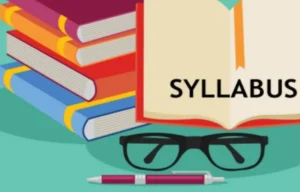Table of Contents
The Jharkhand Academic Council is responsible for conducting the Jharkhand Teachers Eligibility Test (JTET) 2024 to determine candidates’ eligibility for teaching positions in primary and upper-primary teacher posts. The JTET Exam 2024 is expected to be held in January 2025. Candidates planning to appear for the exam must go through the new JTET Syllabus 2024 and Exam Pattern to begin their preparation on the right note.
JTET Syllabus 2024 and Exam Pattern
Candidates preparing for the Jharkhand TET 2024 exam must ensure they are familiar with the most recent syllabus to organize their preparation effectively. This updated JTET Syllabus 2024 provides a detailed breakdown of subject-wise topics and details the pattern for each paper. The JTET exam is divided into two distinct parts: Paper I and Paper II. Each paper has its own specific content and structure, so understanding the distribution of topics and the format of questions is essential. There is no negative marking for incorrect answers in either of these papers, which allows candidates to answer questions without the concern of losing marks for wrong responses.
| JTET Syllabus 2024 – Highlights | |
| Organization | Jharkhand Academic Council, Ranchi |
| Exam Name | Jharkhand Teachers Eligibility Test (JTET) 2024 |
| Exam Level | Class 10+2 Level |
| Exam Mode | Offline |
| Duration | Paper I – 2 Hours and 30 Minutes Paper II – 2 Hours and 30 Minutes |
| Type of Question | Multiple Choice Questions (MCQS) |
| Exam Phase | Paper I (Primary Teacher) Paper II ( Upper Primary Teacher) |
| Marking Scheme | 01 mark for correct answer |
| Negative Marking | No |
| Official Website | https://jac.jharkhand.gov.in/jac/ |
JTET Exam Pattern 2024
Knowing the JTET Exam Pattern 2024 is important for candidates. It provides insights into the type of questions, marking system, subjects, and total marks, allowing you to build a winning test-taking strategy. The JTET exam consists of 02 papers. Each paper consists of 150 multiple-choice questions for a total of 150 marks. The JTET Exam Pattern 2024 for Paper 1 and Paper 2 are provided here.
Jharkhand TET Exam Pattern 2024 for Paper 1
The Jharkhand TET Paper I Exam Pattern for 2024, designed for primary teachers, comprises three sections. It includes two language papers: Language I, focusing on English and Hindi/Urdu, and Language II, which tests proficiency in the regional language. The remaining sections cover child development and pedagogy, mathematics, and environmental studies.
| Jharkhand TET Paper I Exam Pattern 2024 | |||||
| Sections | Subjects | Total Number of Questions | Marks | Duration | |
| Section I | Child Development & Teaching Methods | 30 | 30 | 2 hours and 30 minutes | |
| Section II | Language I | For Assistant Teacher – Hindi (15 Questions), English (15 Questions) | 30 | 30 | |
| For Urdu Assistant Teacher – Urdu (15 Questions), English (15 Questions) | |||||
| Section III | Language II (Regional Language) | 30 | 30 | ||
| Mathematics | 30 | 30 | |||
| Environmental Studies | 30 | 30 | |||
| Total | 150 | 150 | |||
Jharkhand TET Exam Pattern 2024 for Paper 2
The Jharkhand TET Paper II Exam Pattern 2024 for Upper Primary Teachers is structured to comprehensively evaluate candidates across four distinct sections. Each section is allocated a specific number of questions, contributing to the total number of questions and corresponding marks. This format aims to ensure that only the most qualified and well-prepared individuals are selected to teach at the upper primary level.
| Jharkhand TET Paper II Exam Pattern 2024 | |||||
| Sections | Subjects | Total Number of Questions | Marks | Duration | |
| Section I | Child Development & Teaching Methods | 30 | 30 | 150 Minutes (2 hours and 30 minutes) | |
| Section II | Language I | For Assistant Teacher – Hindi (15 Questions), English (15 Questions) | 30 | 30 | |
| For Urdu Assistant Teacher – Urdu (15 Questions), English (15 Questions) | |||||
| Section III | Language II (Regional Language) | 30 | 30 | ||
| Section IV | (a) Mathematics and Science | 60 | 60 | ||
| (b) Social Studies | |||||
| (c) Language Teacher | |||||
| Total | 150 | 150 | |||
JTET Syllabus 2024 For Paper I and II
The JTET Syllabus 2024 for Papers I and II includes several key sections aimed at assessing the teaching capabilities of candidates. Child Development and Teaching Methods cover theories of child development, learning processes, and educational psychology, focusing on effective teaching strategies. Language I and II evaluate proficiency in chosen languages, including comprehension, grammar, and communication skills. Mathematics includes basic arithmetic, geometry, and problem-solving skills. A detailed syllabus is given below.
Child Development & Teaching Methods
Following are some of the topics that a candidate must study while preparing for the Child Development and Teaching Methods subject for the Jharkhand Teachers Eligibility Test.
- How Children learn and think
- Motivation and Implications for Learning
- Individual Differences
- Teaching-learning process
- Intelligence
- Child Development
- Learning Difficulties
- Understanding diverse learners
- Personality
- Adjustment
- Action Research
- Theories of learning and its implication
- Meaning and Concept of learning and its processes
- The Role of Heredity and Environment
- Meaning and Purposes of Assessment
- Factors Affecting Learning
- Right to Education Act 2009
Language I and II
Topics such as unseen prose passages, teaching-learning methods, framing questions, etc. need to be covered by candidates to score well in the language section.
- Comprehensive & Continuous Evaluation
- Principles of Teaching English
- Framing Questions
- Unseen Prose Passage
- Development of Language Skills, Teaching Learning Materials
- Unseen Prose Passage
- Teaching Learning Materials
Mathematics
This section covers the questions based on topics like geometry, LCM/HCF, decimals, fractions, measurement, etc. So, candidates are suggested to thoroughly practice the questions based on these topics for better preparation.
- Shapes and Spatial Understanding
- Pedagogical issue
- Data Handling and Patterns
- LCM & HCF
- Volume
- Number System and Operation in Numbers
- Measurement
- Geometry
- Addition
- Subtraction
- Multiplication
- Division
- Weight
- Decimal Fractions
- Time
Environmental Studies
While preparing for the environmental studies section, candidates need to prepare topics like water systems, solar systems, soil, energy, pollution, etc. The complete list of topics for the EVS section is given below.
- Natural Resources
- Water system
- Solar System
- Basic needs
- Food and Resources
- Geographical features and changes.
- Transportation, communication, and its development
- Local Bodies (Rural & Urban)
- Pollution
- Soil
- Energy
- Travel
- Shelters
- Community Buildings
- Weather and climate
- Habitats
- Parts of Body
- Festivals
- Health
- Diseases
- Good habits and personal hygiene
- Looking at the trees, plants, and animals
- Parts of plants
- Disposal of solid waste
- Disaster management
- First Aid
Science
This subject covers a wide range of topics for the JTET 2024 examination, it is suggested to properly prepare and understands the concepts of Science subjects for better marks.
- Motion
- Force
- Pressure
- Thermal Physics
- The World of the Living organisms, microorganisms, and diseases.
- Acids, base, salt
- Effect of population growth and human activities on the environment
- Atom and Molecule
- Food – production and management
- Metals
- Materials
- Carbon
- Sources of food
- Compounds
- Work and Energy
- Natural Phenomena
- Electric current and circuits
- Pedagogy
- Light
- Sound
- Sources of energy
- Natural Resources
- Environmental concerns – regional and national
JTET Syllabus 2024 PDF
In order to build up their preparation, candidates should prepare with the help of the syllabus. After completing the JTET Syllabus, candidates can solve mock tests and improve weak areas after completing the syllabus. The syllabus pdf for paper 1 and papaer 2 has been shared here.
| Paper | Syllabus PDF |
| Paper 1 | Click to Download |
| Paper 2 | Click to Download |








 Rajasthan BSTC Syllabus and Exam Pattern...
Rajasthan BSTC Syllabus and Exam Pattern...
 CSIR CRRI JSA Syllabus and Exam Pattern ...
CSIR CRRI JSA Syllabus and Exam Pattern ...
 Bank of Baroda Office Assistant Syllabus...
Bank of Baroda Office Assistant Syllabus...


